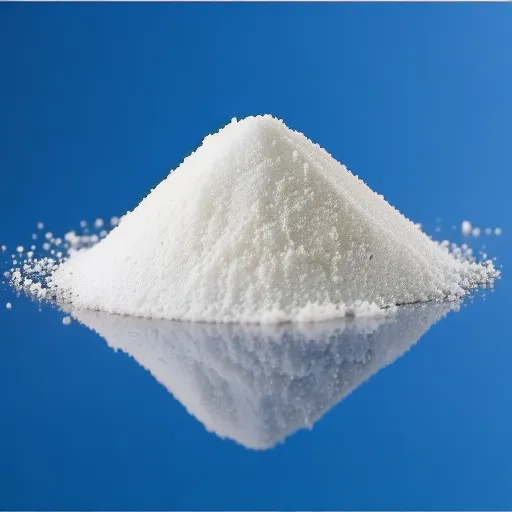لمناقشة سلامة ثلاثي فوسفات الصوديوم في الأغذية والمنظفات
I. مقدمة
يُعد ترايبوليفوسفات الصوديوم (STPP) مادة خام كيميائية غير عضوية مهمة، تُستخدم على نطاق واسع في الأغذية والمنظفات ومعالجة المياه وغيرها من المجالات. في صناعة المواد الغذائية، يستخدم تراي بولي فوسفات الصوديوم بشكل أساسي كمحسنات للجودة، وعوامل الاحتفاظ بالماء، والمستحلبات، وما إلى ذلك. ومع ذلك، مع الاستخدام الواسع لتريبوليفوسفات الصوديوم في الأغذية والمنظفات، فقد أثارت سلامته أيضًا انتباه الناس. سيقيّم هذا التقرير سلامة تراي بولي فوسفات الصوديوم، بما في ذلك تأثيره على صحة الإنسان والأثر البيئي والجوانب الأخرى.
الخواص الكيميائية واستخدامات ترايبوليفوسفات الصوديوم
(1) التركيب الكيميائي لثلاثي فوسفات الصوديوم وخواصه
1. التركيب الكيميائي: ثلاثي فوسفات الصوديوم ثلاثي الفوسفات هو بوليمر خطي يتكون من ثلاث مجموعات فوسفات قاعدية وأيون صوديوم واحد.
2. الخصائص الفيزيائية: مسحوق بلوري أبيض، قابل للذوبان في الماء بسهولة، مع قابلية عالية للذوبان وثبات جيد.
3. الخواص الكيميائية: يمكن أن يتحلل ثلاثي فوسفات الصوديوم إلى فوسفات ثنائي هيدروجين الصوديوم وفوسفات هيدروجين ثنائي الصوديوم في الماء، مع قدرة تخزين مؤقتة قوية وقوة تعقيد.
(2) يُستخدم على نطاق واسع في مجالات الأغذية والمنظفات
1. الصناعات الغذائية: يستخدم ترايبوليفوسفات الصوديوم بشكل أساسي كمحسنات للجودة، وعوامل الاحتفاظ بالماء، والمستحلبات، وما إلى ذلك في صناعة الأغذية. يمكن أن يحسن طعم الطعام وقوامه واستقراره، ويستخدم على نطاق واسع في معالجة اللحوم والدواجن والأسماك ومنتجات الألبان والمشروبات والأطعمة المعلبة والأطعمة الأخرى.
2. صناعة المنظفات: يستخدم ترايبوليفوسفات الصوديوم بشكل أساسي كمادة مضافة في صناعة المنظفات، والتي يمكن أن تحسن من قدرة المنظفات على إزالة التلوث واستقرارها. يمكن دمجه مع المواد الخافضة للتوتر السطحي والمواد القلوية وما إلى ذلك، ويستخدم على نطاق واسع في مسحوق الغسيل وسائل غسيل الأطباق ومنظفات غسيل الأطباق وغيرها من المنتجات.
3. صناعة معالجة المياه: يستخدم ترايبوليفوسفات الصوديوم بشكل رئيسي كمثبط للتآكل ومثبط للتكلس في صناعة معالجة المياه. يمكن دمجه مع مواد كيميائية أخرى ويستخدم على نطاق واسع في معالجة مياه التبريد الصناعية المتداولة، ومياه التكييف المركزي، ومياه الغلايات، وغيرها من الأنظمة.
تأثير ثلاثي فوسفات الصوديوم على صحة الإنسان
(1) السمية الحادة والسمية المزمنة
1. السمية الحادة: السمية الحادة لتريبوليفوسفات الصوديوم منخفضة، والجرعة المميتة عن طريق الفم هي 5-15 جم/كجم. غير أنه قد يسبب في الجرعات العالية انزعاجاً في الجهاز الهضمي وقيئاً وإسهالاً وأعراضاً أخرى.
2. السمية المزمنة: قد يؤدي تناول ثلاثي فوسفات الصوديوم على المدى الطويل إلى تلف الكلى والجهاز القلبي الوعائي والجهاز المناعي وما إلى ذلك. بالإضافة إلى ذلك، قد يؤثر أيضًا على امتصاص واستقلاب المعادن مثل الكالسيوم والفوسفور، مما قد يؤثر على صحة العظام.
(2) التسرطن والسمية الجينية المحتملة
1. مسرطن: لا يوجد دليل قاطع على أن ثلاثي فوسفات الصوديوم مسرطن. ومع ذلك، أظهرت بعض التجارب التي أجريت على الحيوانات والدراسات الوبائية أن تناول ثلاثي فوسفات الصوديوم على المدى الطويل قد يزيد من خطر الإصابة ببعض أنواع السرطان.
2. السمية الجينية: تشير بعض الدراسات إلى أن ثلاثي فوسفات الصوديوم قد يسبب تلفاً للحمض النووي مما يزيد من خطر حدوث طفرات جينية. ومع ذلك، تحتاج هذه الدراسات إلى مزيد من التأكيد.
(3) التأثيرات على الجهاز التناسلي ونمو الطفل
1. التأثيرات على الجهاز التناسلي: أظهرت بعض الدراسات أن ثلاثي فوسفات الصوديوم قد يؤثر على نمو ووظيفة الجهاز التناسلي. ومع ذلك، تحتاج هذه الدراسات إلى مزيد من التأكيد.
2. التأثيرات على نمو الطفل: لا يوجد دليل قاطع على أن ثلاثي فوسفات الصوديوم يؤثر على نمو الأطفال. ومع ذلك، أظهرت بعض التجارب التي أجريت على الحيوانات أن تناول ثلاثي فوسفات الصوديوم على المدى الطويل قد يؤثر على نمو الأطفال وتطورهم وسلوكهم العصبي.
التأثير البيئي لتريبوليفوسفات الصوديوم على البيئة
(1) التأثير على النظام البيئي المائي
1. التأثير على الكائنات المائية: قد يؤثر ثلاثي فوسفات الصوديوم على نمو وتكاثر وسلوك الكائنات المائية. وتشير بعض الدراسات إلى أنه قد يسبب الموت والتشوهات في الكائنات المائية.
2. التأثير على إغناء المياه بالمغذيات: قد يعزز ثلاثي فوسفات الصوديوم إغناء المياه بالمغذيات، مما يؤدي إلى تكاثر الطحالب ويؤثر على توازن النظم الإيكولوجية المائية.
('2` السلوك والسمية الإيكولوجية في التربة
1. التأثير على الكائنات الدقيقة في التربة: قد يؤثر ثلاثي فوسفات الصوديوم على عدد وأنواع الكائنات الدقيقة في التربة. وتشير بعض الدراسات إلى أنه قد يثبط نمو واستقلاب بعض ميكروبات التربة.
2. التأثير على تدوير المغذيات في التربة: قد يؤثر ثلاثي فوسفات الصوديوم على إطلاق مغذيات التربة وامتصاصها، مما يؤثر على خصوبة التربة ونمو النبات.
طرق ومعايير تقييم سلامة ثلاثي فوسفات الصوديوم ثلاثي الفوسفات الصوديوم
(1) اللوائح والمعايير الدولية والمحلية ذات الصلة
1. هيئة الدستور الغذائي (CAC): الحد الأقصى لكمية تراي فوسفات الصوديوم ثلاثي الفوسفات المستخدم في الغذاء هو 0.5 جم/كجم.
2. المعيار الوطني الصيني (GB 2760-2014): تنص على أن الحد الأقصى لاستخدام ثلاثي فوسفات الصوديوم في الطعام هو 0.5 جم/كجم.
3. إدارة الغذاء والدواء الأمريكية (FDA): الحد الأقصى لكمية تراي فوسفات الصوديوم ثلاثي الفوسفات المستخدم في الغذاء هو 0.5 جم/كجم.
('2' طرق تقييم المخاطر السمية والبيئية
1. تقييم السمية: تقييم سمية وسلامة ثلاثي فوسفات الصوديوم ثلاثي الفوسفات الصوديوم من خلال التجارب على الحيوانات والاختبارات على الإنسان.
2. تقييم المخاطر البيئية: تقييم انتقال ثلاثي فوسفات ثلاثي الصوديوم وتحوله وسميته في البيئة من خلال التنبؤ بالنموذج والرصد الميداني.
ستة، أسئلة متكررة
(أ) ما الكمية الآمنة من ثلاثي فوسفات الصوديوم في الطعام؟
وفقًا لأحكام هيئة الدستور الغذائي (CAC) والمواصفة القياسية الوطنية الصينية (GB 2760-2014)، فإن الحد الأقصى لاستخدام ثلاثي فوسفات الصوديوم في الغذاء هو 0.5 جم/كجم.
(ب) كيف يمكن الحد من الأثر البيئي لتريبوليفوسفات الصوديوم؟
يمكن اتخاذ التدابير التالية للحد من التأثير البيئي لتريبوليفوسفات الصوديوم على البيئة:
1. الاستخدام الرشيد: وفقًا للاحتياجات الفعلية، الاستخدام الرشيد لتريبوليفوسفات الصوديوم لتجنب الاستخدام المفرط.
2. معالجة مياه المجاري: تتم معالجة مياه المجاري التي تحتوي على ثلاثي فوسفات الصوديوم وتصريفها بعد وصولها إلى المستوى القياسي.
معالجة التربة: يتم إصلاح التربة الملوثة بتريبوليفوسفات الصوديوم لاستعادة الوظيفة البيئية للتربة.
(3) هل يؤثر ثلاثي فوسفات الصوديوم على امتصاص العناصر الغذائية في جسم الإنسان؟
في الوقت الحاضر، لا يوجد دليل قاطع على أن ثلاثي فوسفات الصوديوم يؤثر على امتصاص العناصر الغذائية في جسم الإنسان. ومع ذلك، فقد أظهرت بعض الدراسات أن تناول ثلاثي فوسفات الصوديوم على المدى الطويل قد يؤثر على امتصاص واستقلاب المعادن مثل الكالسيوم والفوسفور، مما قد يؤثر على صحة العظام. لذلك، يوصى بتناول كمية معتدلة من ثلاثي فوسفات الصوديوم.

